Democratic Progressive Party (DPP) presidential candidate Tsai Ing-wen (蔡英文) yesterday secured a landslide election victory, unseating the China-friendly Chinese Nationalist Party (KMT) by taking 56.12 percent of the vote to become the nation’s first female president.
The DPP swept back into power after eight years in opposition, in the nation’s third transfer of power.
The DPP ticket won almost 6.9 million votes, while KMT presidential candidate Eric Chu (朱立倫) garnered 3.8 million votes, or 31 percent, and People First Party (PFP) presidential candidate James Soong (宋楚瑜) received 1.5 million votes, or 12.8 percent.
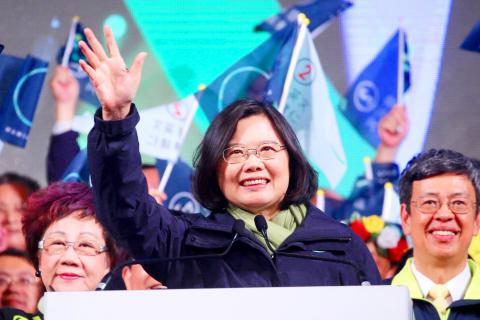
Photo: CNA
Tsai’s performance was the second-best for a presidential candidate since direct presidential elections began in 1996, falling just short of President Ma Ying-jeou’s (馬英九) 2008 record of 58.44 percent of the vote.
It also represented a sharp jump from Tsai’s performance in the 2012 election, which saw her win 45.63 percent of the vote.
Tsai won in all counties and municipalities except Hualien, Taitung, Lienchiang and Kinmen counties, smashing through the Jhuoshuei River (濁水溪) barrier between Yunlin and Changhua counties, which has traditionally demarcated the northern boundary of the DPP’s core support, in a clean sweep of the nation’s northern cities and counties.
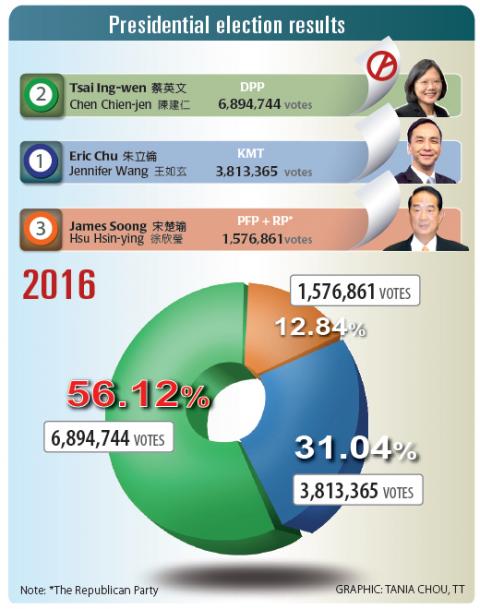
Graphic: Tania Chou, Taipei Times
Chu even lost in New Taipei City, where he serves as mayor.
At Tsai’s national campaign headquarters in Taipei, supporters looking at a large outdoor screen burst into cheers whenever Tsai tallied a further 100,000 votes. As the day progressed, her votes surpassed 1 million, then 2 million and 3 million, with the cheering and flag-waving continuing nonstop as the tally exceeded 6 million.
“We are Taiwanese. We are Taiwanese. We are Taiwanese,” the crowd chanted, in response to both Ma’s China-leaning policies and a Chinese boycott of South Korea-based Taiwanese singer Chou Tzu-yu (周子瑜), who was forced to apologize for carrying a Republic of China (ROC) flag and to say that she is Chinese, in a video uploaded to YouTube on Friday night.
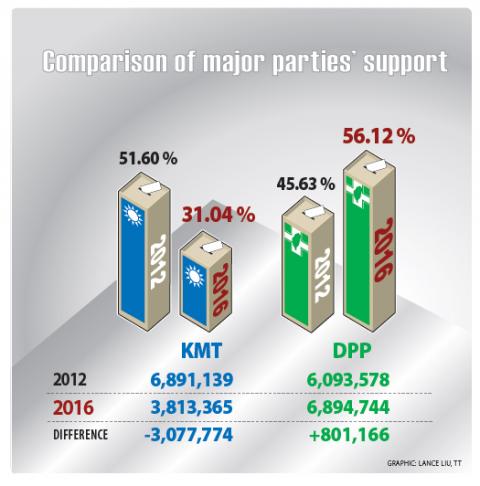
Graphic: Lance Liu, Taipei Times
“With our votes, we proved that we are a sovereign and independent nation,” DPP legislator-at-large-elect Hsu Kuo-yung (徐國勇), who was one of the hosts of last night’s rally, told the crowd. “This is our nation.”
At an international news conference at 8:30pm yesterday, Tsai spoke of her respect for Taiwanese, thanked her rivals and promised cross-party collaboration.
“Today, Taiwanese wrote history with their ballots and signaled the third transition of power since direct presidential suffrage was put in place, as well as the first transition of power in the legislature,” Tsai said. “I would like to show my deepest respect to those who went to the polls.”
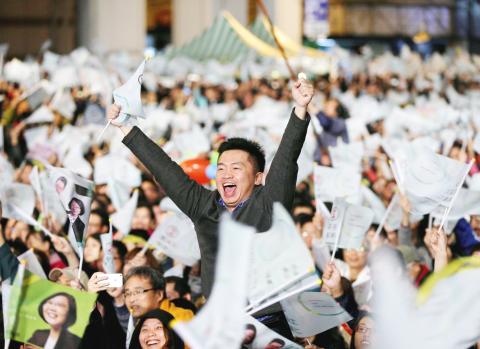
Photo: EPA
As for her rivals, Chu and Soong, Tsai expressed her gratitude that they upheld democratic values so that the election could be completed.
She said that she would take their criticism as a reference for policymaking and would work with other parties to make the nation a better place.
Tsai said that in the four months leading up to her inauguration on May 20, she would work with the current government to complete the transition of power, with the goal of maintaining political stability.
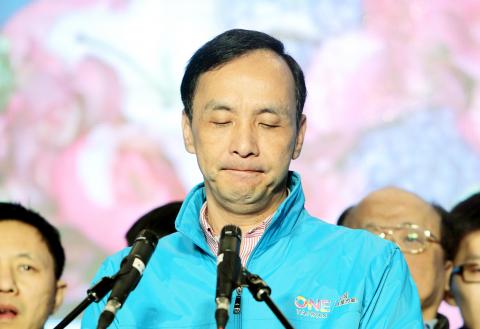
Photo: AP
Chu conceded defeat in the presidential election at about 7pm, apologizing to supporters for failing to live up to their expectations and fulfilling the KMT’s obligation to safeguard the ROC.
“I’m sorry,” Chu told a gathering of somber-looking supporters, some in tears.
“As both the chairman and presidential candidate of the KMT, I cannot shirk my responsibility and must shoulder all the blame. Dear friends, I have failed you. I will immediately resign from my post as KMT chairman,” Chu said.
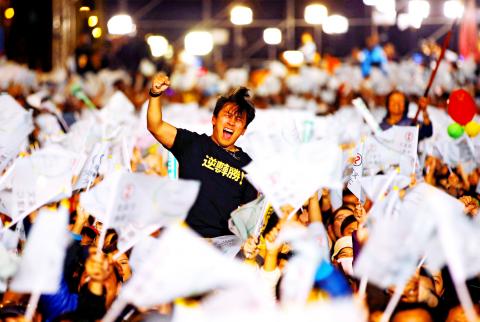
Photo: Damir Sagolj, Reuters
His supporters quickly replied: “We will not allow you [to resign]. The [ROC] flag must not fall.”
Chu said he respects the electorate’s decision and expressed his hope that Tsai and the DPP would endeavor to steer the nation toward a brighter and happier future, which prompted supporters to shout: “Impossible.”
Many supporters shed tears as Chu spoke, with some even leaving in the middle of his speech, saying “it is too sad to listen to this.”
However, some of the KMT’s elderly supporters asked Chu to stop talking, saying: “How dare you keep talking after losing?”
Chu concluded his speech by pledging to reflect on his and the KMT’s defeats and said the KMT would be a responsible opposition party over the next four years.
At the PFP’s headquarters, some supporters began applauding after Soong (宋楚瑜) and his running mate, Republican Party Chairperson Hsu Hsin-ying (徐欣瑩), garnered 1 million votes.
Soong conceded defeat and said he hoped Tsai would keep her campaign promises.
Soong also said that peace is what people on both sides of the Taiwan Strait and around the world want, and the ball is now in the DPP’s court.
“It is the people in Taiwan and China who should be handling cross-strait affairs, not any outsider. The president is the key person in determining the direction of cross-strait affairs,” he said, adding that people on both sides of the Strait hope that cross-strait issues can be handled in a rational manner.
A long-time Soong supporter surnamed Lin (林) said she had hoped that Soong would secure as many votes as Tsai.
Lin said Tsai would have to respond to changes in the world much faster than before and quickly unite Taiwanese after the election.
Meanwhile, Premier Mao Chi-kuo (毛治國) late yesterday said he has tendered his resignation to Ma and would not accept any attempt to have him remain in his post.
The premier’s resignation is pro forma in Taiwan for a ruling party when it loses a major election.
This story has been corrected since it was first published to show that Tsai’s final percentage of the vote was less than President Ma Ying-jeou’s in his first win in 2008.

CHAOS: Iranians took to the streets playing celebratory music after reports of Khamenei’s death on Saturday, while mourners also gathered in Tehran yesterday Iranian Supreme Leader Ayatollah Ali Khamenei was killed in a major attack on Iran launched by Israel and the US, throwing the future of the Islamic republic into doubt and raising the risk of regional instability. Iranian state television and the state-run IRNA news agency announced the 86-year-old’s death early yesterday. US President Donald Trump said it gave Iranians their “greatest chance” to “take back” their country. The announcements came after a joint US and Israeli aerial bombardment that targeted Iranian military and governmental sites. Trump said the “heavy and pinpoint bombing” would continue through the week or as long

TRUST: The KMT said it respected the US’ timing and considerations, and hoped it would continue to honor its commitments to helping Taiwan bolster its defenses and deterrence US President Donald Trump is delaying a multibillion-dollar arms sale to Taiwan to ensure his visit to Beijing is successful, a New York Times report said. The weapons sales package has stalled in the US Department of State, the report said, citing US officials it did not identify. The White House has told agencies not to push forward ahead of Trump’s meeting with Chinese President Xi Jinping (習近平), it said. The two last month held a phone call to discuss trade and geopolitical flashpoints ahead of the summit. Xi raised the Taiwan issue and urged the US to handle arms sales to

State-run CPC Corp, Taiwan (CPC, 台灣中油) yesterday said that it had confirmed on Saturday night with its liquefied natural gas (LNG) and crude oil suppliers that shipments are proceeding as scheduled and that domestic supplies remain unaffected. The CPC yesterday announced the gasoline and diesel prices will rise by NT$0.2 and NT$0.4 per liter, respectively, starting Monday, citing Middle East tensions and blizzards in the eastern United States. CPC also iterated it has been reducing the proportion of crude oil imports from the Middle East and diversifying its supply sources in the past few years in response to geopolitical risks, expanding

Pro-democracy media tycoon Jimmy Lai’s (黎智英) fraud conviction and prison sentence were yesterday overturned by a Hong Kong court, in a surprise legal decision that comes soon after Lai was jailed for 20 years on a separate national security charge. Judges Jeremy Poon (潘兆初), Anthea Pang (彭寶琴) and Derek Pang (彭偉昌) said in the judgement that they allowed the appeal from Lai, and another defendant in the case, to proceed, as a lower court judge had “erred.” “The Court of Appeal gave them leave to appeal against their conviction, allowed their appeals, quashed the convictions and set aside the sentences,” the judges